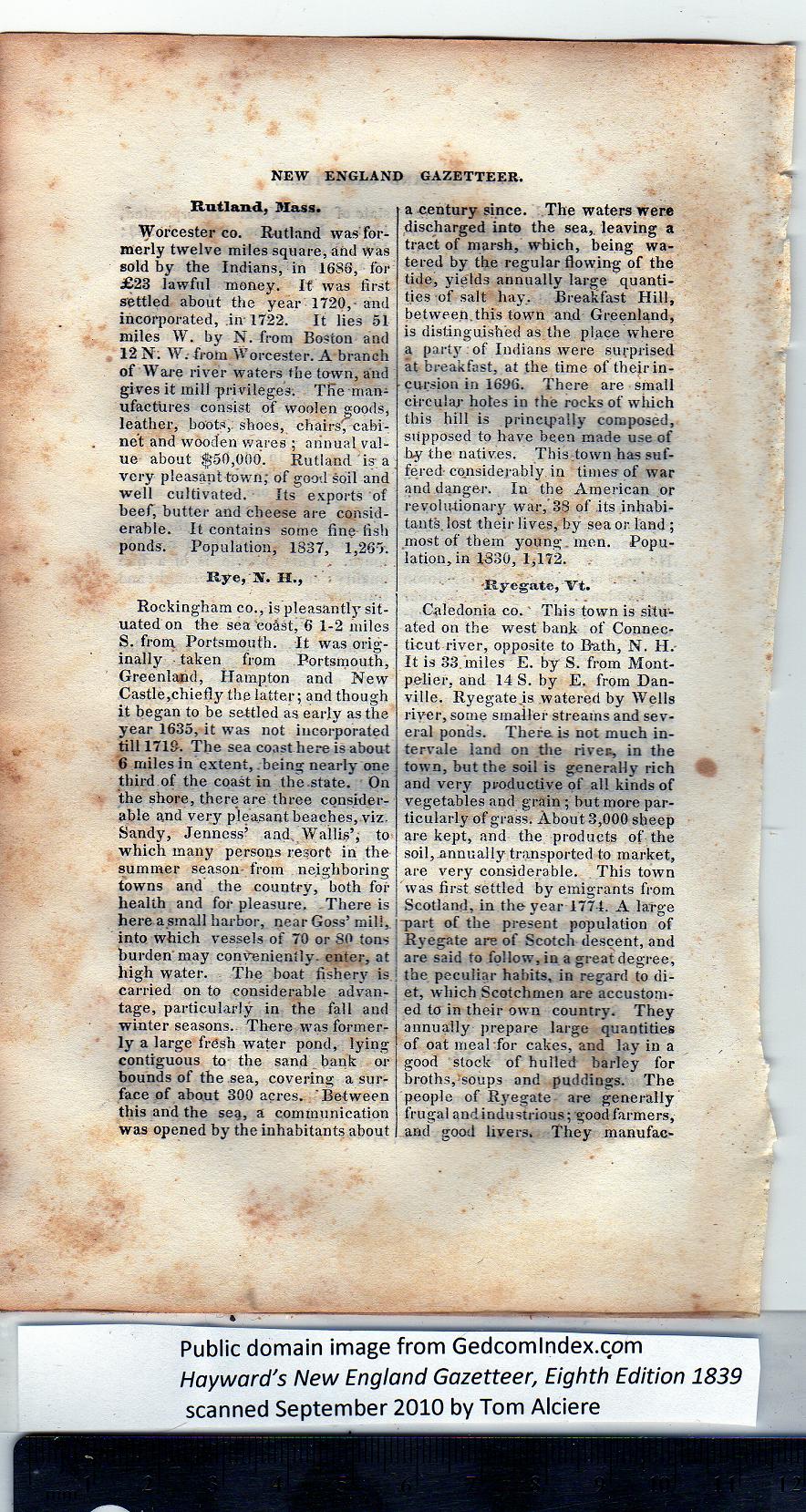|
Rutland, Mass.
Worcester co. Rutland was for-
merly twelve miles square, and was
sold by the Indians, in 1686, for
£23 lawful money. It' was first
settled about the year 1720,- and
incorporated, .in 1722. It lies 51
miles W. by N. from Boston and
12 N. W. from Worcester. A branch
of Ware river waters tbe town, and
gives it mill privileges. The man-
ufactures consist of woolen goods,
leather, boots,, shoes, chairs, cabi-
net and wooden wares ; annual val-
ue about $50,000. Rutland is a
very pleasant town; of good soil and
well cultivated. Its exports of
beef, butter and cheese are consid-
erable. It contains some fine fish
ponds. Population, 1837, 1,265.
Rye, N. II.,
Rockingham co., is pleasantly sit-
uated on the sea‘eo&st, 6 1-2 miles
S. from Portsmouth. It was orig-
inally taken from Portsmouth,
Greenland, Hampton and New
Castle,chiefly the latter; and though
it began to be settled as early as the
year 1635, it was not incorporated
till 1719. The sea coast here is about
6 miles in extent, .being nearly one
third of the coast in the.state. On
the shore, there are three consider-
able and very pleasant beaches, viz.
Sandy, Jenness’ and Wallis’, to
which many persons resort in the
summer season- from neighboring
towns and the country, both for
health and for pleasure. There is
here a small harbor, near Goss’ mil!,
into which vessels of 70 or SO tons
burden may conveniently, enter, at
high water. The boat fishery is
carried on to considerable advan-
tage, particularly in the fall and
winter seasons. There was former-
ly a large fresh water pond, lying
contiguous to the sand bank or
bounds of the sea, covering a sur-
face of about 300 acres. 'Between
this and the seq, a communication
was opened by the inhabitants about |
a century since. The waters were
discharged into the sea, leaving a
tract of marsh, which, being wa-
tered by the regular flowing of the
tide, yields annually large quanti-
ties of salt hay. Breakfast Hill,
between this town and Greenland,
is distinguished as the place where
a party of Indians were surprised
at breakfast, at the time of their in-
■ cursion in 1696. There are small
circular holes in the rocks of which
this hill is principally composed,
supposed to have been made use of
hy tbe natives. This town has suf-
fered- considerably in times of war
and danger. In tbe American or
revolutionary war,'38 of its inhabi-
tants, lost their lives, by sea or land;
most of them young, men. Popu-
lation, in 1830, 1,172.
•Ryegate, Vt.
Caledonia co.' This town is situ-
ated on the west bank of Connec-
ticut river, opposite to Bath, N. H.
It is 33. miles E. by S. from Mont-
pelier, and 14 S. by E. from Dan-
ville. Ryegate .is watered by Wells
river, some smaller streams and sev-
eral ponds. There is not much in-
tervale land on the rives, in the
town, but the soil is generally rich
and very productive of all kinds of
vegetables and grain ; but more par-
ticularly of grass. About 3,000 sheep
are kept, and the products of the
soil, annually transported to market,
are very considerable. This town
was first settled by emigrants from
Scotland, in the year 1774. A large
> part of the present population of
Ryegate are of Scotch descent, and
are said to follow, in a great degree,
the peculiar habits, in regard to di-
et, which Scotchmen are accustom-
ed to in their own country. They
annually prepare large quantities
of oat meal for cakes, and lay in a
good stock of hulled barley for
broths, soups and puddings. The
people of Ryegate are generally
frugal and industrious; good farmers,
and good livers, They manufac- |
